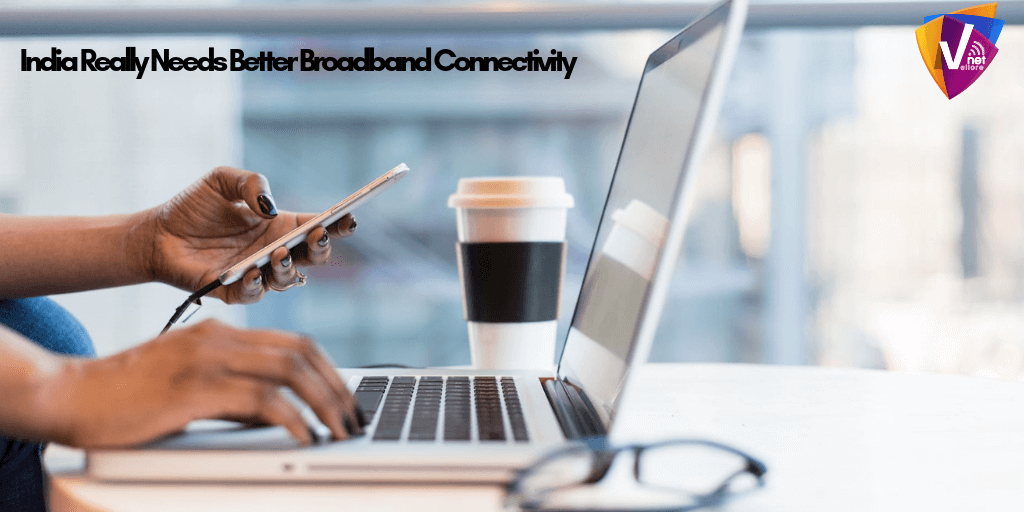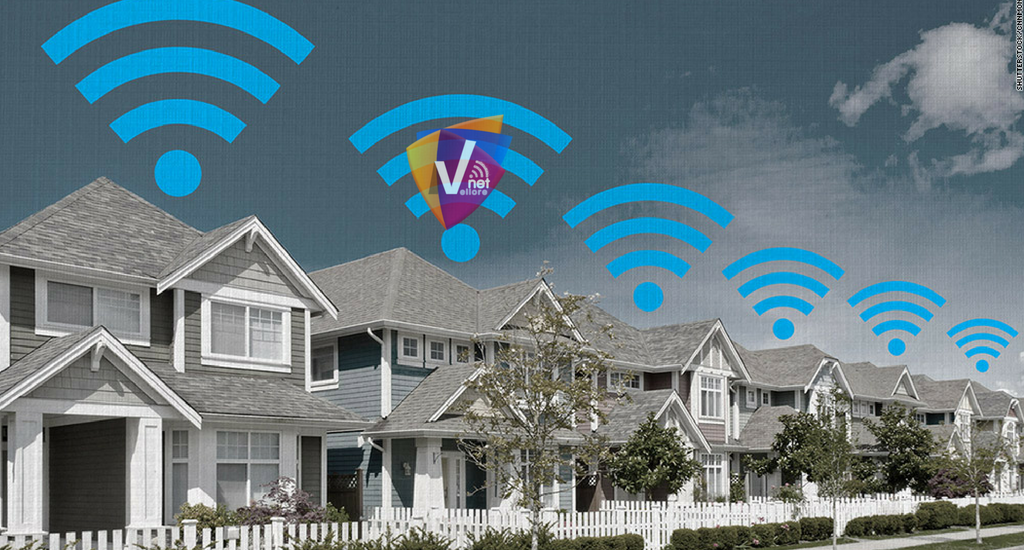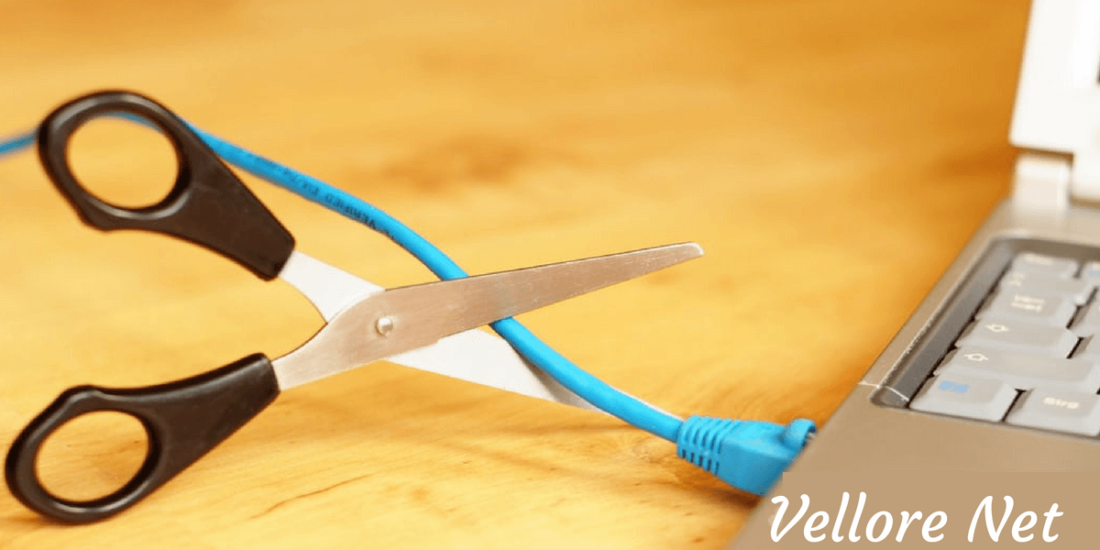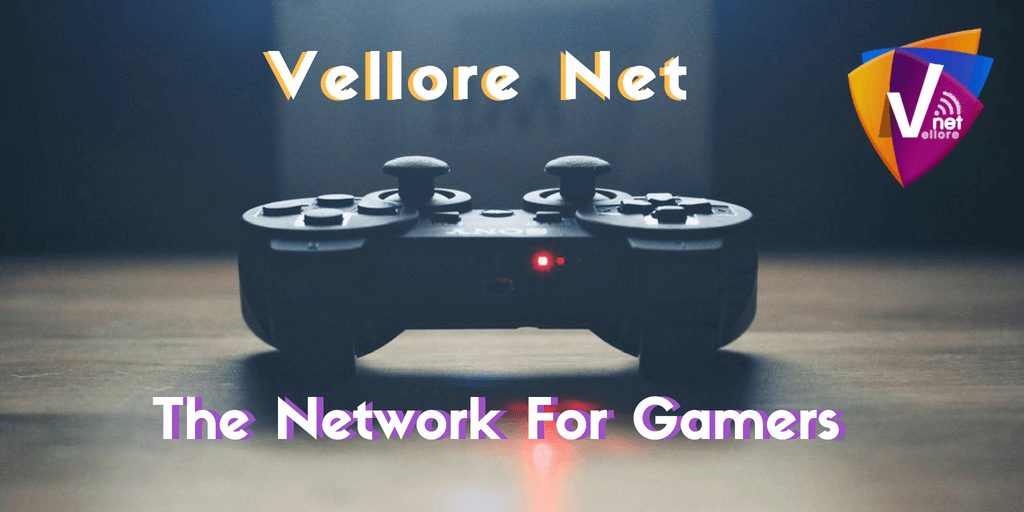Enjoy Broadband Like Never Before with VelloreNet
Almost two decades back, the internet was just a rising tool. During the time when the internet was spreading its legs in India, many people did not have it, in fact, that time most people did not use it. Entrepreneurs did not think to use it as a tool to boost their businesses over the web. But now in the last couple of years, it has seen a rapid change as not just entrepreneurs but all type of users are spending a maximum of their time over the web to explore their desired things.
With a change of time or we can in the last two decades, broadband has gone through various changes. Many technologies have come and gone in with the aim to boost the speed for the users. Today one can easily find various types of connection in the market like –
•Digital Subscriber Line (DSL)
•Cable Modem, Fiber
•Wireless
•Satellite
•Broadband over Powerlines (BPL)
•Fiber Optic
Among all these connection, users always get confused to find the right connection as per their need and requirement. In case, you want to get the latest and one of the unique connections for your home or business, optical fiber connection or fiber to the home (FTTH) is the best connection for you. Speed is something that every user looks for in today’s time. If a connection does not have a good and steady speed then it makes users annoyed and forces them to switch to other service operators in view to get the best speed.
Therefore it is always good for users to find the best broadband service provider in their locale for smooth and hassle-free web browsing experience. Understanding the need of the hour and actual demand of the users, VelloreNet strives to bring the best data plans with unmatchable speed.
Why Use VelloreNet over Others?
There is always a question in the mind of the users, “why to choose any particular service provider over others?” as everyone claims to offer the best service in best price. Yes, we at Vellore Net completely agree with you that all the internet service providers in Vellore to offer best services than others, but actually it is an attempt to attract the users and trap them in their enticing offers so that they can get a connection.
we at Vellore Net want you to try all the service providers and then judge which the best broadband service provider is in terms of speed and connectivity. Unlike others, Vellore Net does not make false claims rather believe in customer satisfaction by providing them speed like never before.
In a short span of time, Vellore Net has emerged as a leading service provider. Today, it is one of the most successful and trustworthy connections in Vellore the Key features of its service are:
•Best unlimited plans at best price (wider options to choose as per your need)
•Strong connectivity even during extreme weather conditions
•Ultra-fast speed even during peak hours
•Fastest downloading and uploading speed
•Allow users to experience buffering free online videos or movies
•Allow you to play online games like never before
It is not that other connections don’t have these features, but there is always an issue of connectivity and speed with them. Vellore Net strives to work out on these issues and adopts the latest technology (Optical Fiber) to provide ultra-fast speed with strong connectivity which allows users to do multiple tasks without the issue of slow connection. So get a connection now and enjoy web browsing like never before!
Know more about internet safety tip
It is evident that the internet has become a necessity in today’s life. In fact, many surveys and reports have revealed that people spend most of their time using the internet whether at home or office. Today it is really hard to think about life without the web world. From mailing to online gaming, there is a need for reliable and faster broadband service. But have you ever think of the safety of your content and work over the web. If not, then it is important for you to understand some internet safety tips for safe and secure web access.
It is true that web connection is always full of virus and at the same time,
hackers and scammers also provide a lot of trouble to it. Not just your systems
like desktops or laptops, but your compact devices like smart phones can also
become a casualty of hacking. Therefore it is highly essential for you to take
some precautions to prevent your systems and devices from such threats, because
avoiding them can be quite dangerous. Always keep following tips in your mind:
• Password: It is always recommended to create a strong password for your important accounts, containing letters, special character, and numbers. It is always hard to crack strong passwords. At the same time, you should not create the same password for multiple accounts because it becomes easy for the hackers to crack the password. Whether for a personal account or financial account, it is good to generate a security question as well.
• Privacy Setting: It is always necessary for you not to allow unauthorized access to your account. It has noticed that a lot of information related to your browsing is shared with third parties that allow hackers and marketers to track your activity over the web. To deal with the issue, many leading web portals and networking sites have now started providing privacy setting to prevent any fraud to your account.
• Safe Browsing: It has also noticed that many unwanted links appear on your screen while browsing. Many times some attractive pop-ups appear on the screen to tempt you and in order to get something excited, you access those pop-ups that can lead to nasty results. Therefore it is always important for you to resist yourself from clicking any unwanted links while browsing. Enjoy safe and secure web access and don’t be careless by any mean!
• Network Security: Securing your network is as important as securing browsing. It is always necessary to install network security with a password-encrypted router so that others can’t access your network without your permission. It helps to prevent other and unwanted devices to connect to your network.
• Stay Updated: It is also necessary for you to update your software and search engine to safe and secure web access
• Anti-Virus: Users should not forget to install good and effective anti-virus software in their system to prevent them from any form or virus. Updating the software is also quite necessary.
•Shop Securely: It is necessary to make a practice of shopping safely over the web. Always try to explore those online shopping portals that are safe and secure for log-in. Check-in URL, whether the portal is secure to access. Once you keep all these points in your mind, you always enjoy safe and secure internet access all the time. It is also good to choose a reliable broadband service provider for hassle-free web access. Among various service providers, Vellore Net Broadband is one of the leading broadband service providers in allows its users to enjoy safe access to the web world and also time to time inform them about the safety tips for safer browsing.
To ensure safe and secure web access Vellore Net strives to adopt the latest technologies and innovative methods so that you can always get connected to the world in a flawless manner. So get a connection of Vellore Net.
India Really Needs Better Broadband Internet Connectivity
Internet population in India is now up to 240 million people. In fact, India is now the third largest Internet user in the world after China and the United States. Despite being in the top 3 in terms of the number of active Internet users in the world, India’s advancement towards a Digital India continues to be disappointed by slow Internet connectivity. Do you know the average Internet speed in India stood at 2.0 Mbps, and India ranked 115th internationally in terms of average Internet speed currently? South Korea is on top with an average speed of 25.3 Mbps and is the only country with average speeds above the 20 Mbps mark. Hong Kong is in 2nd position with 16.3 Mbps while with 15.0 Mbps, Japan on 3rd position.
According to recent calculations, “The number of active Internet users in India will cross the 300 million mark very soon”. Most of the users will be accessing the Internet on their iPhones, smart devices like phones, tablets, etc., at 3G or 4G speeds. But, most Internet service providers reduce the download speeds to about half after users have crossed their pre-defined data-limit for downloading. This affects the average broadband speeds as well as making transactions such as phone banking, ticket booking, etc., very difficult to complete. So, India needs better broadband internet connectivity so as to make efforts towards executing advanced digital services that define the vision of Digital India, for example, smart cities, e-governance, etc.
Vellore Net Redefining Broadband
A reliable and fast broadband service provider in Vellore, TamilNadu is redefining broadband. This service provider has taken plenty of steps towards redefining broadband Internet connection and boasts of several benefits over other ISP in Vellore Some of the key benefits are:
No Problem With Buffering
The most common problem faced by Internet users when dealing with slow Internet speed is Buffering. Vellore Net does its best to provide ultra-fast broadband connections in Vellore that would remove all buffering issues, as a result, uninterrupted connectivity.
Very High Download Speeds
Vellore Net providers high download speeds, so you can download movies, music, games, large amounts of data in quick time. Also, these can be done simultaneously without affecting the speed of the Internet.
Cost- Effective
The Internet plans offered by Vellore Net are affordable and can be afforded by middle-class customers. The customer base of Vellore Net has increased manifold since its inception because the company provides an amazing connection with high download speeds and cost-effective prices for Internet plans in Vellore.
Understanding the Cost of Business Internet Service
A question we hear often is: why is business internet service “marked up” higher than residential services? Business owners, understandably, want to know why they pay more for internet service than their residential counterparts. The short answer: we’re comparing apples and oranges. Residential and business internet, though they may seem the same to the end user, are actually vastly different. Even if, for instance, your office is much smaller than your home, the service you’ll need will likely cost a little more.
How are residential and business internet services different? Let’s dive in and take a look.
Business vs. Residential Internet: The Facts
Before we dive in, let’s explore the term “bandwidth” to set the basis for understanding the many differences between business and residential internet services. Bandwidth is best described as a road. We all know that the more traffic there is, the more congested and slow the flow of cars becomes. If thousands of people are heading home from work at 5:00 pm on a Friday, and they all have to use a two-lane highway, there will be congestion. How do city planners deal with these traffic issues? They build bigger roads with more lanes. A four, six, or eight-lane highway can handle a lot more than a two-lane highway.
Your bandwidth is like this—for both upload and download speeds. If everyone is using the internet at the same time and you don’t have enough bandwidth (or “lanes”), your speed will be as frustrating as rush hour traffic. The bandwidth needs of residential and business internet users are very different. Here’s how.
1. Upload Speed is Essential for Cloud Backup
These days, many businesses are making the smart move to back up their data on cloud-based servers. Even small businesses use Google Drive, Dropbox, and other cloud-based services to keep their data secure and always available. To keep that backup running, a high upload speed is absolutely essential. Most residential internet packages feature a much, much slower upload speed than download speed—a typical package is 20Mbps download and only 2Mpbs upload. This is because most home internet users are downloading, not uploading, on a regular basis, using video streaming and browsing the web. Businesses, on the other hand, maybe (and perhaps should be) running continual backups using their upload speed, and without the right package, these backups won’t work.
2. You Need a Static IP Addresses
If you’re hosting your company’s website and want it to resolve to a server, you’ll need what’s called a static IP address. Same for hosting your office infrastructures such as mail servers, heating, and A/C controls, security cameras, and more. For residential users, this isn’t even available: in fact, there are fewer static IP addresses available these days than there were ten years ago. A static IP address is a necessity for today’s businesses, and it’s part of what comes with a business internet service package.
3. Businesses Don’t Share Connectivity
A typical residential internet connection is shared in a neighborhood. An internet service provider can run cable or fiber into a neighborhood gateway and serve a block or two. For businesses, an ISP will run a dedicated, direct connection, meaning you won’t lose connectivity or experience slowdowns during peak usage times of the day. This is important for productivity and morale levels: no one wants to work harder just because they’re dealing with internet issues.
Want to learn more about business internet services?
Check out this link: https://www.vellorenet.com/wired-wireless-broadband-internet-plans-vellore/
How Do Internet Service Providers Deliver Internet for Your Home
Internet access is pivotal in this day and age, as most of our devices at home and on-the-go require access for us to get things done.
But how do we know what our internet options are?
In this blog, I will give a brief overview of the most common ways the internet is accessed and how to choose the best option for your needs.
Options for Internet Access
Dial-up is not commonly used or offered these days but is important in the introduction of how internet connections work.
If you are old enough to remember getting your home’s first computer, chances are you recall the classic static and beeps while dialing in to get online.
Dial-up worked by taking digital signals from your computer and turning them into audible sounds that would be carried over home telephone wires and then translated back into digital signals translated by computers.
Internet connections essentially still work this way, but the signals and materials it travels through have been upgraded substantially, increasing the speed of information (and there’s no longer a need for your phone to be tied up while you access the internet)
DSL
Instead of just sending voice data through the phone line, now data can be sent simultaneously, and at a higher frequency, so both your phone and your internet connection work at the same time.
A signal filter sorts out both and allows data and voice to be delivered appropriately to either the phone or computer.
In the past, it was relatively easy to upgrade to DSL since it used the existing phone lines to deliver information.
The downside to DSL is that it tends to have slower speeds than other internet connections and is still routed through a phone line. So if you need fast internet and don’t have a phone line set up for your home, it’s unlikely this is an option for you.
Cable
Most of us are familiar with and have access to cable TV. Cable television essentially uses different frequencies through a coaxial wire to access each channel your specific plan provides.
Cable Internet, simply stated, is just another “channel” or frequency that is installed by cable companies for you to access the internet.
A modem sorts out the frequencies and delivers them in appropriate formats to your TV and computer, allowing both TV and internet to work simultaneously.
Wireless
A wireless internet connection is unique, such that it uses radio frequencies to send an internet signal to a location.
The wireless ISP sends signals to a tower, which receives and sends the signal to your home.
A receiver (often roof mounted so it can point directly toward the tower) picks up the signals and sends them to your home modem to provide a connection.
Because the internet is delivered through different frequencies, you’ll need to establish what frequency receiver you need based on your proximity to a tower, but this is made simple when you work with a reputable internet service provider such as VelloreNet.
Satellite Dish
With a satellite connection, communication is between a satellite ISP transmitter (located in the sky) and a dish receiver, which is located on your roof.
Using high-frequency radio waves, these three items communicate while a modem translates the signal from your dish to your computer.
The satellite has many hindrances due to the distance the signal has to travel, making it a slower option than others on the market.
Mobile Internet
With the prevalence of smartphones, many people use the mobile internet every day.
Using radio waves, voice and data are transmitted at the same time to and from phones. How the data is relayed through the cell signal varies, depending on if a phone user has 3G, 4G, or LTE. And coverage depends on a mobile carrier, not an internet provider.
So the real burning question, why does the cost vary so much for different types of internet service?
While all these services differ in speed, cost, and effectiveness, thinking about where you live and what you use the internet for can help you choose the best option for your needs. Need help deciding on the best option for you? We can help!
Don’t Cut Corners on Your Business Internet Service
You have high standards for your business: you require everything you do to meet your expectations of excellence. From customer service to the products and solutions you provide, you’re consistently aiming high. The tools you use to get the job done should do the same thing, and none more so than your business internet service.
Most successful business professionals will agree: the way to the top of the competitive ladder isn’t through cutting corners. And yet, many companies are relying on outdated internet service technology, meaning they’re left with spotty service and slow results. They experience frequent slowdowns and system-wide failures; their employees are always complaining about how long it takes to do anything around the office because of slow internet.
Why would a smart business cut corners in internet services? Most of the time, it’s not intentional. Company management sometimes isn’t aware they’re getting a bad deal, instead, assuming that the package they’ve purchased should be adequate. Other times, it’s just a matter of misunderstanding how much good internet services cost: business managers will assume that if they want a better internet, they’ll have to pay far too much—and this just isn’t true.
Here’s what you should demand from your internet service provider. If you’re getting anything less, it’s time for a change.
Bandwidth and Then Some
The most common issue for businesses is a lack of bandwidth. Of course, your needs will vary—and even change over time—based on how many employees you have and what your company does day-to-day. But it’s always worthwhile to have enough to handle heavier workdays as well as the lighter ones. You have a few options for your high-speed internet needs.
- Ethernet/DSL: Ethernet or DSL (Digital Subscriber Line) technology works over local phone lines to transmit data. Although it became quite popular as users began to move away from dial-up modems, it’s an outdated solution by today’s standards and not very reliable.
- Cable: A standard coax cable line can provide your business with cable internet services. This is an attractive option but can cause bandwidth issues during popular usage times since it’s shared among many businesses and residences.
- Fiber: Fiber internet is the most versatile option for a business. It’s completely scalable—meaning that you could start today with a smaller package and upgrade later as your company grows. You’ll never pay more than you need to.
- Wireless internet service delivers reliable internet connections in areas where DSL, cable, or fiber optic options are not available. If your business is located in a rural area, the wireless internet allows you to get and keep your business online.
Make sure you’re asking the right questions before signing an internet services contract, starting with how much bandwidth you’ll need to accomplish your regular online tasks.
Security
There is no wiggle room in the reality of business today: you can’t cut corners on internet security. As we’ve seen from the high-profile hackings of companies like Sony and Target, your internet security must be top-notch to withstand the increasingly sophisticated threats from spammers and online criminals. Any company you work with should be able to prove their commitment to security.
Fast Issue Resolution
If you have an outage or an on-site failure, you need assistance immediately. This is as crucial as having the electricity up and running at your office location, and your internet service provider should treat it that way. You should be able to count on quick resolution so you can get back to your job with less downtime and no hassle.
An Eye Toward the Future
You don’t have time to keep up with ever-evolving technology, but keeping up is a significant part of success in today’s business world. Your internet service provider (ISP) should be able to help you stay current with technologies that will contribute to your business’s productivity and should plan for the future.
Ready to demand more from your internet service provider? We make the internet easy.
The 5 Stages of Losing Internet Service and How To Skip Them
We can’t quite remember what we did before the internet. It seems that work used to be done by professionals pre-internet, but these days, we use the world wide web to accomplish almost everything. When your internet goes down at your home or your office, work virtually comes to a halt.
But that’s not all that happens when your internet service goes dark and you find yourself disconnected from the world. It’s almost like you go through the stages of grief—that could include smashing a few things or screaming into pillows (but hopefully not that dramatic). According to our highly scientific research, these are the stages you can expect to experience when your internet goes down.
What You May Feel if You Lose Your Internet Connection
Denial
At first, you can’t believe it. You keep hitting “refresh” while woefully informs you it’s lost network connection or you frantically try to save your report you were typing into a cloud server.
You turn to your co-worker and ask, voice shaking, “Do you have internet?”
You frantically call the IT department. “Tell me the internet isn’t down. PLEASE. This can’t be happening right now.
Anger
From there, it’s a fast spiral into the most volatile stage of internet loss: anger. You realize you’re stuck in the middle of a Stranger Things episode until further notice, or you truly have lost every last bit of your report that you didn’t save.
In this stage, we suggest taking a coffee break to cool off. We know there’s nothing more frustrating than losing your internet service.
Bargaining
You calm down and start trying to fix the problem. But since you’re not an IT expert and you just need your internet to work, you’re stuck turning things off and on over and over again. Every time your router blinks on and off and your computer restarts, you’re pleading: “Please work, please work, please work.” Without expert support and a closed loop fiber backbone, your bargaining is likely to be in vain.
Depression
You’re beginning to realize there’s no way out of your internet black hole. You’ll just have to live here, alone–no Netflix, or email, or cloud, or productivity. Goodbye, cruel world.
Acceptance
You become a hermit, forget there was ever such a thing as 24/7 internet access,
Alternatively, you could choose Vellore Net options and skip this entire process—if that appeals to you, of course. We work tirelessly to save our customers from the grief of losing the internet. Because of our commitment, no Vellore Net customer is ever dropped—guaranteed. Our closed loop fiber backbone in Vellore providing a redundant connection so your internet won’t go down.
What Does This Mean for Vellore Net Customers?
Even if the line were cut, a signal would still flow. With Vellore Net, you can skip the stages of internet loss (even in rural areas) and instead focus on getting stuff done or on enjoying your Internet Service.
Vellore Net – the network for gamers
Most internet service providers (ISPs) tend to sell their service based on two variables: bandwidth and data allowance. For the most part, this is enough information for potential customers to make a decision about the service (and provider) they will ultimately choose. There is a group of users, however, for whom the above, while important, should certainly not be the be-all and end-all in any decision.
So why do we believe that Vellore Net should be the ISP of choice for gamers? There are a number of additional factors that gamers should take into account when choosing an ISP, which will be discussed below.
No doubt, keen gamers will already be aware of much of the terminology that follows. Some explanation will be given, however, if only to serve as a reminder or as an introduction to those new to the world of gaming.
Latency
Latency, or lag, or ping will be a familiar term to many online gamers. In perhaps its simplest terms, it refers to the amount of time it takes a packet of data to reach its intended destination. For gamers, a more vivid explanation might come in the form of the following example:
Imagine playing a first-person shooter game, pressing the trigger to shoot an opponent, and then waiting a second for your weapon the fire in the game. This would be an extreme example of lag, and in such a scenario your character probably wouldn’t last very long.
For gamers, a simple rule applies: the lower the latency the better. Anything under 100ms should be acceptable but the ideal aim should be for latency to be no more than about 30-50ms.
A somewhat related concept, jitter, is the variation (in milliseconds) in latency.
If you have a typical latency of 100ms and zero jitters, gameplay would tend to be very smooth and predictable. However, if your jitter was, say, 100ms then this means that on occasions your latency might be as high as 200ms.
Like latency, the goal is for your jitter to be as low as possible. Many gamers talk of ‘latency spikes’ – moments when latency suddenly jumps up to unacceptably high levels. This is invariably caused by the jitter of the connection.
If you are experiencing high levels of latency or jitter, there are some steps you can take to improve the situation:
⇒ Use a wired connection (that is, physically plug your PC or console into the router) rather than wireless if possible. This is likely to produce a notable improvement
⇒ Shut down bandwidth-consuming processes on your PC – if you’re downloading or streaming something while you’re gaming, this can have a considerable effect on latency.
A good internet connection should provide low-enough latency and jitter to enable smooth online gaming most of the time and, from this point of view, typically, there will not be many variations between providers.
Occasionally, though, problems with latency can crop up due to issues on the line, or on your ISP’s network. The advantage of choosing an ISP like Vellore Net is the expert service and tech support you will receive. Our staff will work to ensure that you receive the very best product at all times, and that includes working to improve your latency should there be an issue.
Speed
Speed is a much more straightforward concept to deal with – the higher the better, right?
Well, we will examine shortly why a faster connection can indeed be of great benefit. However, for the actual playing of games connection speed tends to show diminishing returns once a certain level is achieved.
For many online games, much of the processing tends to take place locally (on your machine). The amount of data that gets transferred in a second is usually fairly low. For this reason, a connection of about 1Mbps is usually adequate for playing games online.
There is a fairly major caveat to this, though. This might be considered a benchmark figure, but it leaves little margin for error. If other people are using your connection at the same time, if you’re also engaged in voice chat with your gaming colleagues or if your connection speed tends to vary, then a 1Mbps connection might not be enough.
However, given that the vast majority of connections today are much quicker than this, the chances are your connection speed will be more than adequate for your gaming needs.
Where speed does become an important issue is in the downloading of data. Whether you’re downloading entire games (which might be tens of gigs in size) or sizeable game updates and patches, a fast internet connection can be of real benefit. The faster your connection, the sooner your game data will download, and the sooner you can get on with playing.
Data allowance
As mentioned above, the amount of data you use while gaming is likely to be fairly low. For this reason, it is not essential to have a huge download limit if you are predominantly using the internet for playing games.
However, as also touched on above, many gamers today not only download their games from online repositories but frequent game updates can often be several gigabytes in size. For this reason, a good (preferably unlimited) data allowance is recommended.
Traffic management
Many ISPs advertise a certain feature, such as a particular speed or download limit, but tend to provide varying degrees of traffic management.
For example, an ISP might slow down your connection speed at certain times of the day, or when you’ve downloaded a certain amount of data in a month.
As well as throttling speeds, an ISP might put restrictions on certain types of traffic passing through their network.
At Vellore Net, you won’t be victim to this type of management – we believe in providing you with what you’ve paid for. This means that, if you’re downloading lots of games, or you like to play even during the busiest periods of the day, you shouldn’t experience any degradation in performance.
Stability and reliability
It doesn’t matter how fast your connection is, or how low your latency is if your internet is going to be disconnecting every few minutes.
A stable, reliable internet connection is absolutely critical for online gaming.
At Vellore Net, we care about your experience, and we’ll do our utmost to ensure that you receive the best experience possible, no matter what you’re using the internet for. Check out our packages here.
10 Things Businesses Require from Their Internet Service Providers
For most of us, the Internet has become a constant fixture. Imagine a day without using Google, posting photos online, or checking your email! The same can be said of businesses who consider the Internet as an indispensable tool for their daily operations — from video conferences, employee training to large file downloads.
Whether you’re a solopreneur or running a team spread across the country, a day without Internet connectivity, or even just super slow connection speed, could translate to decreased productivity and even worse, profit loss. Internet connectivity is so valuable.
While it’s incredibly easy to sign up for the first Internet Service Provider offer you’ll come across, smart business owners understand that choosing a broadband provider means carefully taking stock of several variables before making the decision.
What Businesses Need from Internet Service Providers
At the end of this article, you will have a clearer picture of what you should require from Internet Service Providers the next time you’re shopping for the best in your area.
Sufficient Bandwidth
This is one of the key requirements that business owners and managers should thoroughly evaluate. Of course, your bandwidth needs will depend on the nature and size of your operations. With this in mind, begin your assessment with the following questions:
• How fast do you really need your Internet connectivity to be?
• How much bandwidth do you anticipate requiring?
• How many devices do you estimate are going to need to transfer data?
• Do you need point-to-point connectivity?
Once you’ve answered those questions, your next step is to learn about the different types of high-speed Internet options. Here’s a primer of your options:
Cable
Cable Internet mainly relies on standard coax cable lines that were originally run to provide television service. This is one of the most popular options for both residential and business customers. Speed may be slower during peak hours because bandwidth is shared among users in the vicinity.
Fiber
For businesses, this option is obviously better than DSL or cable. For one, you almost always get equal download and upload bandwidth. Fiber also provides scalability — you can start with 10 megabytes today, and if you need 100 megabytes (or much more), your provider can easily increase your bandwidth.
Focused on Security
This is another variable that should be on top of your list. Sure, there are lots of provider options out there, but not everyone can guarantee that you will be protected from spam, spyware, viral threat, and even intrusion. The company should be committed to security, even down to doing background checks on their own employees.
Shorter Installation Timelines
Most ISPs take 30 to 60 days for them to set up a connection to a new location. When shopping for your business ISP, you and your provider should be working closely with regards to timetables and expected delivery times.
Accessible Support
When things go south on your connection, you need customer support who goes the extra mile. Yes, it’s all about computers, servers, and bits of data, but if your ISP lacks that human touch, it’s probably high time that you switch providers. In most cases, solid customer support is even worth the extra expense. Apart from fantastic customer care (check online reviews!), opt for a provider who offers. 24/7 technical support.
Timely Troubleshooting Response
How quickly does the ISP respond to a reported outage or send their field service techs on site if a failure occurs? Check for field response policies and make sure that they meet your business needs as well as possible worst-case-scenarios. Often, it takes a day or two for a team to fix outages by being physically present in the area. Imagine how a day’s worth of delay will impact your business.
Future-Oriented
These days, everything evolves so rapidly that you never know when a new Internet technology will surface. This is why it pays to work with a provider who understands the need to be future-oriented.
Reliable Upload and Download Speeds.
Does your enterprise require faster-than-normal upload and download speeds? Or do your operations require only the usual web browsing and mail setup? Your answer plays a role in choosing the right Internet service for your needs. Plus, you need to consider how many users will be connected at one time, and what they will be doing while online e.g. do they need to constantly check emails, share files, or upload videos. Also, is your ISP throttling bandwidth at certain times of the day or when using certain services?
Routing
At its core, the Internet is the global system of interconnected computer networks that use the Internet protocol suite (TCP/IP) to link billions of devices worldwide. An Internet Service Provider (ISP) connects your office network to the many interconnected computer networks that make up the Internet. The ISP connects to these networks via transit (paid) and non-transit (non-paid) connections. The connection to every network in the world is known as a route.
When you choose an ISP, whether they have transit or non-transit connectivity (in most cases it is a combination of both), what your business cares about is being able to get to every network in the world in which you need to connect to for your business to succeed.
Making the Right Decision
As always, knowledge is power. Knowing what you should look for in an ISP can spell the difference between profit and loss; between achieving optimum production and poor delivery times. Still, you alone know the full nature of your business and operations.
The takeaway is to find an ISP who makes an effort to understand your business needs, and who can make adjustments to accommodate both your short-term needs and long-term goals.
Haven’t made the decision yet? Ask a trusted expert for more insights on how to choose the best Internet provider for your enterprise.
Most Common Internet Connection Problems (and How to Solve Them)
Everyone is on the internet. It’s everywhere, all the time, and there is no escaping the daily need for internet connection. Streaming television shows, sending emails, gaming tournaments with your nearest and dearest all require a strong internet connection. Unfortunately, more often than any of us would like, we suffer a disconnect and lose our access to the online world.
When the inevitable happens and your internet connection wanes or fails to connect completely, you do not have to panic. There are a few simple, tried-and-true methods for reconnecting your system and getting back to your day as quickly as possible.
Most of the time, a lag in your system is an indicator of a problem in your home’s system, and not with your Internet Service Provider (ISP). The only way to make sure that it’s not an ISP issue is to tackle the troubleshooting and see if you can get your internet connection back up to speed.
Check Your Power
We have all done it. Slammed, poked at, and jabbed our computer’s keyboard and wondered why it wasn’t working, without ever checking to see if the power is on. If your internet is out, step one is definitely to make sure that your router has not gotten unplugged or is half-in, half-out.
Check the router’s LED status indicator lights. If you see no lights at all, your router is probably unplugged or not getting any power at all. The fix here is as simple as it gets: disconnect the power supply and reconnect it.
If your router still won’t turn on, it’s time to check your outlet and your power strip to see if they are getting power. If your outlet or power strip is to blame, problem solved.
Check Your Network Connection
If you are not getting an internet connection on only one device, like your phone or your laptop, but you are getting an internet connection on others, check your Wi-Fi connection. If you are connected to a network, but you still do not have internet, it is time check your computer’s Network via the System Preferences -> Network (on a Mac) or Right-click on the Network Icon -> select Trouble Shooting to run a diagnostic check (on a PC).
If you do not have Wi-Fi, but use Ethernet, check your Ethernet connection. Confirm that you are getting an internet connection. If you have one on hand, plug in your spare Ethernet cable directly you’re your computer.
Check Your Router
Physically examine your router and make sure that everything is connected where it should be. Check all of your router’s lights and look out for any problem colors like orange or red lights, and whether or not any of your lights are blinking.
If you are using an older router, you may be experiencing lag from having multiple devices fighting for a bandwidth. It may be time to upgrade to a newer router that can handle the workload of your devices.
Restart Your System
Begin with your router – unplug the power source, wait 30 seconds, and then plug it back in. Once your router is back on, check the system again and see if your internet connection has returned. If it has not, do the same unplugging and restarting task with your computer and power strip.
If All Else Fails, Call Your ISP
When you have done all of the basic troubleshooting to tried and resolve your connection issues, but nothing has worked, it may be time to contact your Internet Service Provider. Over the phone, your ISP will be able to ping your equipment and check your system on their end to see if there are any identifiable connection issues.
Should the problem persist beyond what can be handled over the phone, a service technician will come to your home and perform an inspection to ensure that all cables and equipment, both indoors and outs, are in working order.
Once the problem has been identified, your service technician should have you up and be browsing the internet again in no time flat.
If you are a Vellore Net customer and you are having problems connecting to the internet, give us a call at and speak to one of our service representatives. We aim to provide our customers with very best service and keep you all connected to the internet anytime, anywhere in Vellore city.










